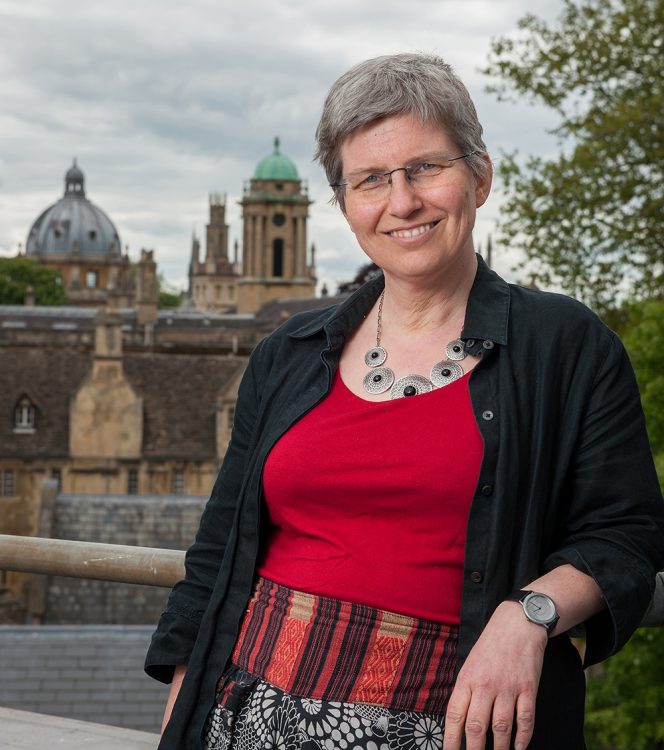Henrike
Professor of German Medieval and Linguistic Studies and Professorial Fellow

I come from a family of strong-willed women: my maternal grandmother Eleonore Dörner, née Benary, went as the only girl to a boys grammar school in Ełk (then part of Prussia) because she insisted on learning Latin and Greek; she later was able to impress Martin Heidegger with her knowledge of Greek and did a doctorate in medieval German literature. Her aunt, my great-grandaunt Annemarie Benary, whom I remember well, went to her care home fancy dress party in her pyjamas as a Chinese revolutionary, turning her bedsheets into a banner to demand more freedom for the old people living there. My godmother Lela Lähnemann became the first person in Germany to take up a position as full-time LGBT officer, created for her in Berlin – and outstrips everybody else in my family with book sales of her adoption guide for same-sex couples. But perhaps even more important than as role models was my extended family’s ability of story-telling, opening up a world of classical literature, historical knowledge and a rich tapestry of fantastical characters. I got hooked on words, poetry, songs, fairy-tales… Before I could read, and after a short phase in primary school where I wasn’t sure whether I wanted to become a pirate or an abbess, I fairly soon settled on wanting to work with books – and to talk about them to people.
It feels therefore entirely natural to have landed at St Edmund Hall with its two libraries and a community of people eager to share knowledge and enthusiasm for ideas and ideals. My way to here was via a series of places and topics, all linked by medieval origins: Münster, Lüneburg, Nürnberg, Bamberg, Edinburgh, Berlin, Göttingen, Tübingen, Zürich, Newcastle (where the “new” means 11th century, the Old castle being Hadrian’s castle), arriving in Oxford in 2015.
German literature has a majority of women studying it but, as in most subjects, the ratio gets lower and lower the further up the academic career path you get. When I worked in Newcastle as Chair in German Studies, I was approached by the committee of the society “Women in German Studies” whether I would take on chairing the group. I wasn’t even a member until then but there was not a single full professor in German Studies in the UK besides me, apart from the women who had been chairing WiGS in the past.
I agreed and really grew to love the solidarity of the group and particularly networking with early career women from across the different areas of German Studies. And I realised how important this lobby work was (and still is), both for Modern Languages and for women in academia.
As most people who have met me in the Hall will realise, most of my favourite memories include either the mock-medieval ceremonial trumpet or the crypt or a combination of both. Just two weeks ago, a doctoral student of mine organised a workshop on a Bodleian manuscript which took place in the Old Dining Hall. After dinner we sang a Latin-Old High German Compline in the crypt with a world-first performance of a bespoke composition by James Whitbourn, our Director of Music, streamed via YouTube to medievalists and friends of the Hall around the world. I love the combination of Norman architecture and ethernet cable – I guess unique at least in Oxford!
Another particularly glorious afternoon was the Medieval Mystery Cycle in 2019, a completely madcap mix of about 300 actors and spectators from across the Oxford community and academia who gave a run-through history from Creation to Last Judgement. For the latter I was up on the tower with the trumpet, signalling the breaking of the seals. It was so windy that I needed two grad students to give hand signals when to play a fanfare, since I couldn’t hear a word and also couldn’t look over the parapet for fear of being dragged by the banner of the trumpet across the threshold. On 23 April, starting at 12noon with the chapel bell ringing, will be a second edition of this spectacle – everybody invited! Do have a look at the recordings of the 2019 plays and the announcement for the 2022 cycle here.
What do you think of when you hear ‘Women of the Hall’? What does the Hall mean to you?
As you will have gathered from the previous examples, I love the spaces and people of the Hall!
I had the luck of having very active graduate advisees who have taught me a lot about women’s rights, the situation in other countries and activism, e.g. Catherine White (2016) who scared me during her time at the Hall by being in seven or so theatre performances as lead actress but still managed to get a first in the MSt in Women’s Studies. She has since gone on to be an actress, work for the UN and getting funding for a short film ‘Farewell She Goes’ about two early modern women. It has already gathered a number of awards and will hopefully launch formally in the Hall later this year, so watch out for this!
A very special moment was the day when we elected Kathy Willis as first female principal of the Hall. We were at that time just eight women on Governing Body (out of 42 members) and it felt like a huge moment. I still have a slightly blurry selfie we took in the Ladies in the SCR when we hung up our gowns in a feeling of elation.